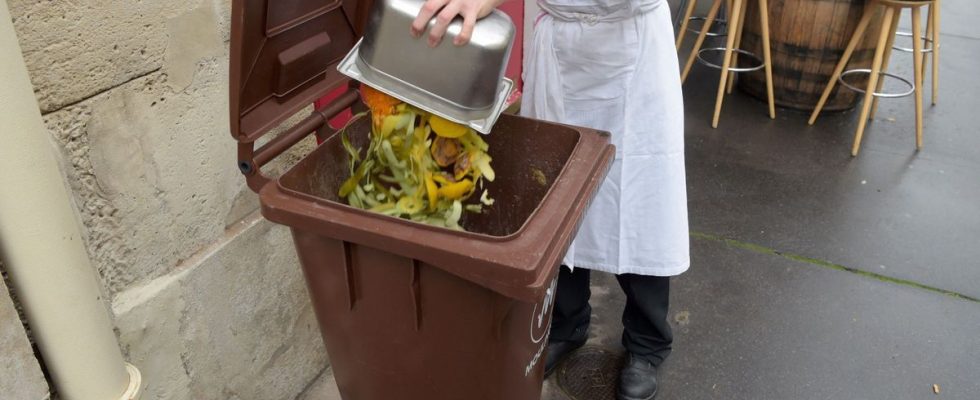Published on
Updated
Reading 3 min.
Peelings, kitchen leftovers: sorting of bio-waste will have to become widespread in France from January, to lighten our bins and produce compost or biogas, a reform mentioned since the 2010s but which, despite the law, will only concern a minority of homes immediately.
Symbol of this change, the bucket which is used to collect the approximately 30% of organic matter contained in our household waste: peels, egg shells, coffee grounds, leftover meals, sometimes given to chickens or dogs, composted in the garden but most often thrown away in the gray bag.
It must be admitted that “some communities still have investments to continue“, indicates to AFP the Ministry of Ecological Transition, as the deadline of January 1, 2024 set by the 2018 European directive and the 2020 anti-waste law approaches.
Only 27 million French people, or 40% of the population, will have a solution in 2024, according to the ministry. And again, since this figure includes the 10 million local residents who will be happy to be able to request a compost bin at home on a voluntary basis.
“The primary challenge is to remove biowaste from the landfill or incinerator, because it contains a lot of water, and burning it does not make sense.“, underlines Vincent Coissard, head of the waste and circular economy sub-directorate at the ministry.
But “to say that if people do not sort things out, they will be fined 35 euros, that is completely false“, he insists.
“Determination”
Some municipalities have taken a head start, such as Lorient (Morbihan) where this has been working for twenty years, Thann and Cernay (Haut-Rhin) which launched in 2010 with an incentive fee: the bill depends on the size of the bio-waste bin and frequency of collection.
Other successful examples are thriving: in Locminé (Morbihan), we run on bio-waste, and in Lamotte-Beuvron (Loir-et-Cher), we heat ourselves with it.
“For ten years I was relatively alone, it takes willpower“, defends Pascal Bioulac, the mayor (Horizons) of Lamotte-Beuvron who built a methanizer reprocessing sewage sludge, bio-waste and agricultural inputs, including tons of manure generated by the town’s equestrian park.
He had to deal with the objections of those who told him “be careful, it’s going to explode, it stinks”, he tells AFP, and accept being considered “a UFO” to other elected officials who were wondering “why bother if you don’t have an obligation.”
In Europe, “France ranks neither in the first nor in the last. There are cities that are doing very good work“, notes Manon Jourdan, from the NGO Zero Waste Europe, which campaigns for the reduction of waste and the pollution it generates.
No single recipe
So what’s holding you back? “There is the question of the cost of collection and acceptance by the population“, analyzes Ms. Jourdan.
“The issue of waste remains emotional because we have to influence the way people behave at home, and elected officials are always afraid that it will be poorly received. So, we come back to a political will“, she says.
In total, according to Ademe, the ecological transition agency, 83 kilos of bio-waste are generated per year and per inhabitant in France, 50% of which could be easily captured instead of ending up in landfill or incinerated.
“Even with hyper pessimistic hypotheses, the biogas deposit is very important“, underlines Roland Marion, from Ademe, without giving a figure.
Where it is already in place, there is no single recipe.
Some municipalities have opted for door-to-door collection, others for voluntary drop-off points. The bin can be secured with a badge or a QR code to allow weighing and prevent a passerby from throwing anything into it.
As for the nuisances, odors or critters, highlighted by the refractory parties, Ademe recognizes that “we are not safe from rodents but there are solutions”.
We can put grids at the bottom of the composters, or ensure sufficient frequency of collections. In Milan, a pioneer city copied many times in Europe, the truck passes twice a week, and almost every day for the hotel-restaurants.
